|
|
|
Sort Order |
|
|
|
Items / Page
|
|
|
|
|
|
|
| Srl | Item |
| 1 |
ID:
060104
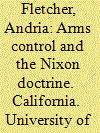

|
|
|
|
|
| Publication |
California, University of California, 1972.
|
| Description |
28cm.
|
|
|
|
|
|
|
|
|
|
|
|
Copies: C:1/I:0,R:0,Q:0
Circulation
| Accession# | Call# | Current Location | Status | Policy | Location |
| 009306 | 327.174/ARM 009306 | Main | On Shelf | General | |
|
|
|
|
| 2 |
ID:
071969
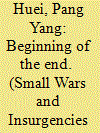

|
|
|
|
|
| Publication |
2006.
|
| Summary/Abstract |
The 'Nixon Doctrine,' announced on 25 July 1969, which emphasised the singularity of US interest over all others, was a reflection of US war weariness and the President Richard Nixon's political constraints. The net effect was the unilateral withdrawal of troops in phases and Vietnamisation returning combat responsibilities to the South Vietnamese. Indeed, negotiations and diplomacy fell short of expectations, failing to force the North Vietnamese to abandon their objectives. However, Vietnamisation, the third leg of Nixon's strategy, became the most visible of Nixon's failures. Such was the debacle that Nixon was sorely tempted to simply walk away concluding, 'Vietnamization has been completed and [South Vietnam President Nguyen Van] Thieu then can do what he likes.'
|
|
|
|
|
|
|
|
|
|
|
|
|
|
|
|
| 3 |
ID:
052750
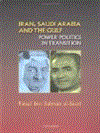

|
|
|
|
|
| Publication |
London, I B Tauris, 2003.
|
| Description |
xiii, 181p.hbk
|
| Standard Number |
1860648819
|
|
|
|
|
|
|
|
|
|
|
|
Copies: C:1/I:0,R:0,Q:0
Circulation
| Accession# | Call# | Current Location | Status | Policy | Location |
| 048353 | 953.8053/SAL 048353 | Main | On Shelf | General | |
|
|
|
|
| 4 |
ID:
114626
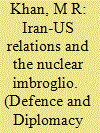

|
|
|
|
|
| Publication |
2012.
|
| Summary/Abstract |
Prior to World War II, the US involvement with the Persian Gulf
was minimal as it was regarded as a British preserve. However,
during the war, a US Middle East Command was created to oversee
the supply route of war material to the Soviet Union through Iran
and it consisted of some 30,000 personnel. But after the war, it was
reduced to a small contingent stationed at Jufair and Bahrain under
an arrangement with the British. The task of containment of the
Soviets in the huge arc from the Suez to the Malacas was also left to
the British. When the UK decided to withdraw from the region in
1968 due to financial constrains, Washington was in no position to
fill the so-called vacuum due to its heavy commitments elsewhere,
especially in Vietnam.
|
|
|
|
|
|
|
|
|
|
|
|
|
|
|
|
| 5 |
ID:
038282
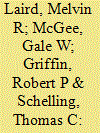

|
|
|
|
|
| Publication |
Washington, D C, American Enterparise Institute for Public Policy Research, 1972.
|
| Description |
79p.pbk
|
|
|
|
|
|
|
|
|
|
|
|
Copies: C:1/I:0,R:0,Q:0
Circulation
| Accession# | Call# | Current Location | Status | Policy | Location |
| 013592 | 973.924/LAI 013592 | Main | On Shelf | General | |
|
|
|
|
| 6 |
ID:
183950
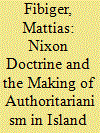

|
|
|
|
|
| Summary/Abstract |
President Richard Nixon arrived on the Pacific island of Guam in the late afternoon of July 25, 1969. Only hours after witnessing the splashdown of the Apollo XI spacecraft, Nixon spoke to reporters and articulated what came to be known as the Nixon Doctrine. The president focused his remarks on the need for a post-Vietnam War framework for American involvement in Asia. He argued that geography and history had fashioned of the United States a Pacific power, one whose interests and responsibilities stretched far beyond its western shores. And a Pacific power it would remain. Only the United States, Nixon insisted, could deter aggression by communist states like China, North Korea, and North Vietnam. But the president went on to explain that changes on both sides of the Pacific demanded a new American strategy. In the United States, the “frustration” wrought by the Vietnam War imposed limits on Americans’ willingness to bear the burdens of the defense of freedom abroad. Meanwhile across the Pacific, nationalist consolidation and economic development had rendered Asia far more secure, and the region’s people “no longer want to be dictated to from the outside.”1 These new circumstances, Nixon concluded, demanded a new policy: the United States would continue to furnish its Asian allies with the military and economic aid—but no longer the manpower—necessary to subdue threats that arose within their national borders.
|
|
|
|
|
|
|
|
|
|
|
|
|
|
|
|
| 7 |
ID:
112148
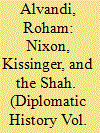

|
|
|
|
|
| Publication |
2012.
|
| Summary/Abstract |
The Nixon Doctrine marked a turning point in American strategies of containment in the Persian Gulf. Whereas Lyndon Johnson had sought to balance Iran and Saudi Arabia as the "twin pillars" of the region during the British withdrawal "east of Suez," between 1969 and 1972 Nixon gradually adopted a policy of Iranian primacy. Declining Anglo-American power does not provide an adequate explanation for this shift in U.S. Gulf policy. These constraints confronted both Johnson and Nixon, yet each president adopted quite distinct Gulf policies. Drawing on American, British, and Iranian sources, this article makes the case that the shift in U.S. Gulf policy from balancing under Johnson to Iranian primacy under Nixon reflected a change in American thinking about the shah of Iran, Muhammad Reza Pahlavi. This change in American thinking provided fertile ground for the shah's relentless efforts to secure Washington's backing for Iran's regional primacy throughout the 1970s.
|
|
|
|
|
|
|
|
|
|
|
|
|
|
|
|
| 8 |
ID:
123034


|
|
|
|
|
|
|
|